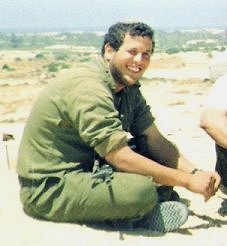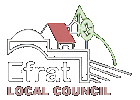
When a person dies, people from all walks of his life meet together - people who had an influence and people who were influenced. As we stand here this evening and say the name, Amikam, we know that each person here is reminded of a different aspect of Amikam. In his short life, Amikam managed to become a part of many and versatile social groups. In every group, he was able to touch each individual and guide him in his own special way towards moral values and truth. In light of this old-yet-new portrayal of Amikam emerging this evening, we found it difficult to summarize his life. So we decided to include his family, his friends from the Jewish quarter, from Kfar Habad, from Moshav Keshet and from the army, in order to achieve a truer and more complete picture of who Amikam really was - and is - to us today. What we know for sure is that whatever picture comes to mind, Amikam's broad smile and insatiable love of life will always be in that picture. While we join here together in our anguish to tell about Amikam, his life, his dreams and his loves, it is especially important to us to tell about Amikam as a friend - everyone's friend, and to say that we are glad and proud that we were privileged to have been a part of his 21 years of life.
Arrival in Efrat
We stood there, a few friends, in the Gefen, when a big van and car suddenly stopped. Out came a mother and father, a few boys, and a girl. One of us said: "Let's go meet them and introduce ourselves." But we stood still, a bit embarrassed. And then one of us said: "No need to go over to them. One of them is heading our way." In a panic, we turned to one another: "What should we ask? What should we say?" He came towards us and asked: "Who are you? What are your names?" "Wow, he is so brave," we thought. "Maybe we should invite him." And we kept looking at him and nudging each other with our elbows, and suddenly he said, "Come on in and taste some of my mother's great spaghetti and salad and delicious cakes." We followed him in and whispered to each other, "Let's ask him what his hobbies are and what he likes to do." Then he turned to us, smiled, and said: "So what do you guys like to do? Do you like music? Do you want to go somewhere?" We went into his house. Instead of us welcoming him, he welcomed us into his new home. Stories of the Jewish quarter, of Hezi and Hannan and more about the Jewish quarter flew through the air. From that moment on, things were never the same. New ideas and a new atmosphere had taken hold of the sixth graders in Efrat and we loved it.

High School
Among the most important values to Amikam were friendship and comradeship. At the end of eighth grade, Amikam was worried about the distances which would separate us when we dispersed to different high schools and yeshivot, some of us here and some of us there. "Keep in touch," Amikam kept saying. "We must stay in contact with each other." And at the end of the week, back from our respective yeshivot, we sat and told stories in order to be with him, and he wanted to hear our stories and be with us. His devotion taught us to make an effort; he educated us in the way he believed. We went to Kfar Habad, we were with him there and we met a slightly different Amikam, in a new setting. He had met some new people. He had new stories and new songs to share. We learned a new chapter in life thanks to him. We learned that distance is only a physical separation. We loved everything he taught us - we loved it all.
Keshet
Far from Efrat, in the northern part of Ramat Hagolan, Amikam found answers to his questions. Like every young man before the army, Amikam stood at a crossroad in his life, trying to find the right path between serving his country and his spiritual growth. As a continuation of the education he received at home and influenced by his two older brothers, Amikam chose to spend a year strengthening his spiritual beliefs in a religious pre-army yeshiva. After a year of study, he planned to join one of the combat units of the army. Amikam utilized that year to do many things: touring throughout the northern part of Israel which he loved, spending time with old friends and new ones, and intensive study which led to real change. This Amikam would sit down with some friends for a serious discussion, to try to understand or delve into an idea with depth and sensitivity. One of the most important topics to Amikam during that period of time was the army. He worried about how he would be able to balance two "flags" - religion and devotion to the country. There was no need for him to worry. He exhibited his beliefs and dedication to his country with pride and honor. It turned out that this was the time that most influenced Amikam. He learned that he could overcome difficulties, especially spiritual challenges. He knew it about himself and we felt it and loved it.

Sinai
Amikam had many dreams. One of his dreams, that he was able to fulfill, was to go down to Sinai, to breathe the hot desert air. Sinai meant more than just a desert - it meant freedom, it enabled him to pause from the chaotic pace of our lives and to think. Amikam loved the sensation, the time and the atmosphere so conducive to discussions, talking and meditating about the meaning of life, dreams and wishes. Each time he came back from Sinai, he was changed, more pensive and much happier. When he returned from Sinai, he told us about everything, describing his experiences, the happiness he felt there - until we all felt that we had been there with him, sitting on a mountain watching the sunrise, drinking coffee with the Bedouin. We went diving with him, we walked along the beach barefoot with him, and we talked until the wee hours of the morning… apparently it is easier to learn to love things there, to appreciate things just a little bit more.
 The Army
The Army
"This is it," Amiko said one day. "Pretty soon I will no longer be a private citizen." The party that we organized was our way of ending one era and beginning a new one. It was attended by the greatest people, lots of friends, in the most beautiful place, with the best music. It was impossible not to sense the excitement, accompanied by a measure of fear for the unknown future. Amikam joined the Shaked unit of the Givati Brigade. As always, we felt a part of Amikam's service in the army through the stories he told us and the experiences he described - lugging the heavy gun around, the training exercises, talking with the other soldiers. Even if he didn't get home very often, he made sure to immediately find out where everyone was, to visit, to stay in close touch. We all knew that he was in one of the regular units, and as time passed, we also learned about the great hardships which he underwent during the course of his army service - both physical and spiritual - and through it all, he held his head up high and never forgot to extol the virtues of all he had learned over the years. Everything was measured according to truth, happiness and spiritual joy and happiness.

Conclusion
We could sit and tell more and more but it is late and it is so hard. Amikam- it is so hard for us to believe that we are here today, talking about you in the past tense. It is so hard for us to believe that you are not here with us - you of all people - so full of hope and dreams and joie de vivre. You, who could see ahead and set goals for yourself and make them come true. It is so hard for us, Amikam, so very hard. We sit and write about you, half laughing and half crying, and it seems as though you are still here with us, very much alive, influencing us, so much a part of us. Our yearning for the future is now tinged with sadness. Our joy and our dreams are now incomplete, not like they were meant to be. Amikam - your death is very painful, but we know that a part of you lives on in each and every one of us, and through us, many of your dreams will be fulfilled. Your memory will always be with us - during both our happiest and saddest moments. Amikam - you taught us that physical distance doesn't count. We internalized that lesson and we will strive to apply it. And all that is left to say to those with us here today is: Amikam, we loved you and we will continue to love you always.
|







